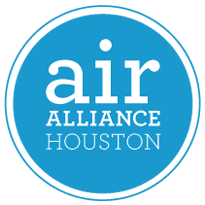As industrial activities in our region are expanding and as vehicle miles traveled are increasing, it is more important than ever that our elected officials have adequate plans to address air pollution and ensure the safety of our communities.
We encourage you to question the Mayoral and City Council candidates about their air quality agenda. To help you do that, we have developed the below candidate questionnaire:
10 Facts You Should Know About Air Quality in Houston and 10 Questions You Should Ask Your Elected Officials What They Plan To Do About It
The Greater Houston area faces unique air quality challenges and communities throughout Houston are impacted by air pollution from both heavy traffic and industrial facilities. Below are 10 facts about Houston’s air quality and questions that you can ask candidates, your elected officials, and other decision-makers about how they plan to address these issues.
FACT: Houston is home to over 400 chemical and manufacturing facilities, over 150 concrete batch plants, and more than 140 metal recycling facilities that can expose residents to harmful air pollutants. Industry is expanding and Houston already releases more toxic air pollution than the top five metropolitan economies combined.
QUESTION(S): Would you support initiatives to monitor the air quality near sources of air pollution in your district? How would you engage industry to ensure they are taking the necessary steps to protect the health and safety of residents?
FACT: The majority of air pollution in the region is generated from traffic-related emissions. Air toxics from vehicles, such as benzene and formaldehyde, can cause damage to the immune system, reproductive and neurological disorders, and respiratory problems.
QUESTION(S): What do you think are the most effective strategies to decrease traffic-related air pollution? What is your position on expanding highways to mitigate traffic congestion?
FACT: Houston does not have enough air monitoring. To better understand communities’ exposure to toxic air pollution and develop appropriate mitigation strategies, a robust community air monitoring network is needed.
QUESTION(S): Would you work with outside organizations to support plans to improve community air monitoring where there are existing gaps?
FACT: Major chemical incidents are frequent in the Houston area, putting the health and well-being of communities at risk. An analysis in 2016 by the Houston Chronicle found that there is one chemical accident in Houston every six weeks.
QUESTION(S): Do you support the establishment of a toxic alert system to notify residents in “real time” that their health and safety are at risk from chemical disasters?
FACT: While the Port of Houston is a major contributor to air pollution in the Houston region, and has no Clean Air Plan. The Port of Houston lacks transparency in its decision-making and operations and these decisions have a direct impact on the health of communities nearby.
QUESTION(S): How will you work with the Port of Houston to ensure that it develops a Clean Air Plan? How will you advocate for impacted residents to have a voice and influence in Port decision-making processes?
FACT: The voices of communities, particularly those that suffer disproportionately from environmental injustices, are often ignored or not able to influence decisions that can adversely affect their health.
QUESTION(S): Will you support the establishment of a standing Environmental Advisory Committee that includes representation from environmental justice communities?
FACT: TCEQ has only held facilities accountable for 3% of violations during the past 5 years. TCEQ is now making it even easier for industry to pollute our air.
QUESTION(S): How do you plan to work with elected officials locally and across the state to advocate for more enforcement control at the local level?
FACT: There is a disparity of twenty-three and a half years between Houston neighborhoods in the average number of years a person can expect to live. These differences are closely aligned with cancer risk from air toxics.
QUESTION(S): What steps have you taken or are you willing to take to address these health inequities?
FACT: The Houston area ranks second in the nation for carbon dioxide emissions per capita.
QUESTION(S): How will you support the recommendations that are outlined in the Climate Action Plan? What other policies do you think will help the region become more resilient from the impacts of climate change?
FACT: Elected officials and government agencies throughout the country and around the world are increasing their efforts to address air quality through policy changes, increasing funds to support air monitoring and mitigations, and partnering across sectors.
QUESTION(S): What investments do you plan to make to address air quality in your district? How will you directly engage impacted residents? How will you hold problematic facilities accountable?

